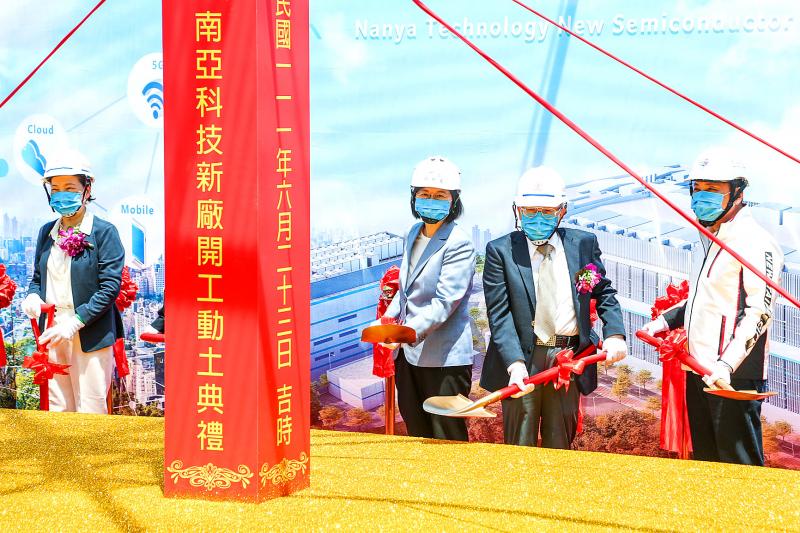DRAM chipmaker Nanya Technology Corp (南亞科技) yesterday said it expects a mild decline in revenue this year as mounting inflation is depressing spending on consumer electronics, which has led to an inventory correction from PC and smartphone companies.
The correction is expected to extend into the next quarter and is likely to last through the fourth quarter, defying the traditional business pattern for the chip industry.
The third quarter is usually a peak season, Nanya said.

Photo: CNA
“There are lots of black swan events this year. Mounting inflation, in particular, has significantly dampened consumer confidence and their purchasing power,” Nanya president Lee Pei-ing (李培瑛) told reporters on the sidelines of a groundbreaking ceremony for the company’s new factory in New Taipei City’s Taishan District (泰山).
“Nanya Technology has done quite a good job in the first half of this year. We hope [revenue] would drop only slightly for the whole year of this year, compared with last year,” Lee said.
Aside from PCs and smartphones, the adverse effect of inflation is likely to spread to server DRAM demand, Lee said.
Server buyers might start to tighten their capital expenditures in the final quarter of the year, he added.
Nanya’s revenue inched up 0.04 percent to NT$32.74 billion (US$1.1 billion) in the first five months of this year, after posting its lowest monthly revenue last month as an uneven supply of key components worsened due to China’s lockdowns.
Despite the slowdown, Nanya does not plan to scale back this year’s planned capital spending of NT$28.4 billion, but some payments might be deferred to next year due to delays in equipment delivery amid a shortage of key components, Lee said.
The chipmaker plans to adjust capacity allocations to cope with the short-term shocks, as it believes the DRAM industry would grow in the long term, given its vital status in the digital transformation, Lee said.
The company serves more than 800 customers with diversified products, he said.
PC DRAM accounts for only about 20 percent of the company’s total revenue, he said.
The company plans to invest NT$300 billion in the new 12-inch fab. That would add 45,000 12-inch wafers to the firm’s monthly capacity of 70,000 wafers, helping it to capture new growth opportunities.
The chipmaker expects the fab to start commercial shipments in 2025 rather than in 2024, with a monthly capacity of 15,000 wafers in the first phase.
The company plans to deploy 10-nanometer process technology, developed entirely by the chipmaker, he said.
It also plans to use extreme ultraviolet lithography, or EUV, tools when the chipmaker starts producing chips using fourth-generation 10-nanometer technology, it said.

UNCERTAINTY: Innolux activated a stringent supply chain management mechanism, as it did during the COVID-19 pandemic, to ensure optimal inventory levels for customers Flat-panel display makers AUO Corp (友達) and Innolux Corp (群創) yesterday said that about 12 to 20 percent of their display business is at risk of potential US tariffs and that they would relocate production or shipment destinations to mitigate the levies’ effects. US tariffs would have a direct impact of US$200 million on AUO’s revenue, company chairman Paul Peng (彭雙浪) told reporters on the sidelines of the Touch Taiwan trade show in Taipei yesterday. That would make up about 12 percent of the company’s overall revenue. To cope with the tariff uncertainty, AUO plans to allocate its production to manufacturing facilities in

TAKING STOCK: A Taiwanese cookware firm in Vietnam urged customers to assess inventory or place orders early so shipments can reach the US while tariffs are paused Taiwanese businesses in Vietnam are exploring alternatives after the White House imposed a 46 percent import duty on Vietnamese goods, following US President Donald Trump’s announcement of “reciprocal” tariffs on the US’ trading partners. Lo Shih-liang (羅世良), chairman of Brico Industry Co (裕茂工業), a Taiwanese company that manufactures cast iron cookware and stove components in Vietnam, said that more than 40 percent of his business was tied to the US market, describing the constant US policy shifts as an emotional roller coaster. “I work during the day and stay up all night watching the news. I’ve been following US news until 3am

COLLABORATION: Given Taiwan’s key position in global supply chains, the US firm is discussing strategies with local partners and clients to deal with global uncertainties Advanced Micro Devices Inc (AMD) yesterday said it is meeting with local ecosystem partners, including Taiwan Semiconductor Manufacturing Co (TSMC, 台積電), to discuss strategies, including long-term manufacturing, to navigate uncertainties such as US tariffs, as Taiwan occupies an important position in global supply chains. AMD chief executive officer Lisa Su (蘇姿丰) told reporters that Taiwan is an important part of the chip designer’s ecosystem and she is discussing with partners and customers in Taiwan to forge strong collaborations on different areas during this critical period. AMD has just become the first artificial-intelligence (AI) server chip customer of TSMC to utilize its advanced

Six years ago, LVMH’s billionaire CEO Bernard Arnault and US President Donald Trump cut the blue ribbon on a factory in rural Texas that would make designer handbags for Louis Vuitton, one of the world’s best-known luxury brands. However, since the high-profile opening, the factory has faced a host of problems limiting production, 11 former Louis Vuitton employees said. The site has consistently ranked among the worst-performing for Louis Vuitton globally, “significantly” underperforming other facilities, said three former Louis Vuitton workers and a senior industry source, who cited internal rankings shared with staff. The plant’s problems — which have not